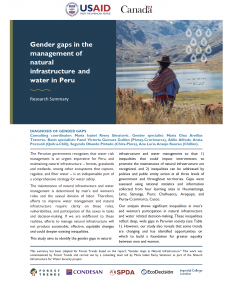Gender gaps in the management of natural infrastructure and water in Peru
Research Summary
View PublicationThe Peruvian government recognizes that water risk management is an urgent imperative for Peru, and maintaining natural infrastructure – forests, grasslands and wetlands, among other ecosystems that capture, regulate, and filter water – is an indispensable part of a comprehensive strategy for water safety. The maintenance of natural infrastructure and water management is determined by men’s and women’s roles and the sexual division of labor. Therefore, efforts to improve water management and natural infrastructure require clarity on these roles, vulnerabilities, and participation of the sexes in tasks and decision-making. If we are indifferent to these realities, efforts to manage natural infrastructure will not produce sustainable, effective, equitable changes and could deepen existing inequalities.
The maintenance of natural infrastructure and water management is determined by men’s and women’s roles and the sexual division of labor. Therefore, efforts to improve water management and natural infrastructure require clarity on these roles, vulnerabilities, and participation of the sexes in tasks and decision-making. If we are indifferent to these realities, efforts to manage natural infrastructure will not produce sustainable, effective, equitable changes and could deepen existing inequalities.

